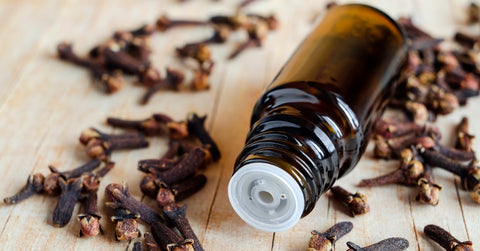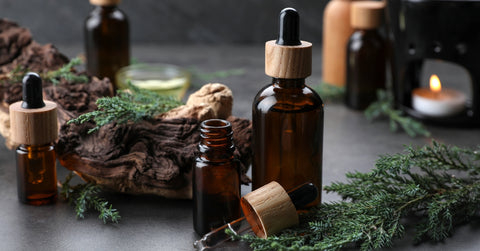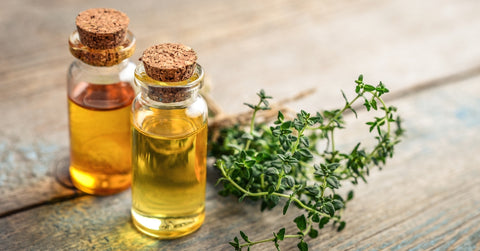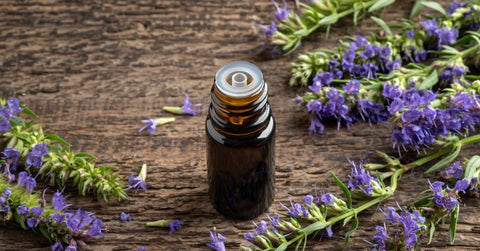The Best Essential Oils For a Sore Throat

Struggling with a sore throat can disrupt your day, leaving you seeking relief. What natural remedies can soothe this discomfort effectively?
For soothing a sore throat, essential oils may be your ally. The top contenders include Clove, Juniper, Lemon, Thyme, Rosemary, Peppermint, and Hyssop Essential Oils. Each possesses unique properties that can help reduce inflammation and alleviate pain.
My journey as a wellness enthusiast has led me to explore the healing powers of nature, and essential oils have been a personal remedy for various ailments, including sore throats. To bring you the most reliable information, I've delved into scientific research and sought insights from experienced herbalists, ensuring that the essential oils recommended are not only effective but also backed by trusted authorities in natural health.
What Causes a Sore Throat?
A sore throat is a common affliction that can stem from various causes, each triggering discomfort in its own way. Viral infections, like the common cold and flu, are the usual suspects, often accompanied by a cough, runny nose, or fever. Bacteria, such as Streptococcus pyogenes, can lead to strep throat, a more severe condition characterized by intense soreness and difficulty swallowing. Allergies are another common cause, with pollen, dust, and pet dander irritating the throat. Environmental irritants, including smoke, pollution, and dry air, can also lead to a scratchy and uncomfortable throat. Understanding these triggers is crucial in seeking the right treatment and relief.
How Essential Oils Can Help With A Sore Throat
Okay, so imagine your throat is all scratchy and sore. How do these oils help? Well, they're kind of like tiny superheroes for your throat. They have special powers that can fight the germs that make your throat hurt. Some oils are like shields that stop the germs from causing more trouble. Others are like gentle hugs that help calm down the redness and puffiness inside your throat. Some even work like a cool ice pack to numb the pain a bit so it doesn't hurt so much when you gulp down your favorite drink. Essential oils are nature's way of helping your throat chill out and get better without needing to use stuff like medicine. They're like a warm, soothing tea for your throat, making it feel all cozy and comfy while it heals.
How To Use Essential Oils For a Sore Throat
Aromatic Use
Breathing in Relief When you use essential oils by breathing them in, it's like sending a special healing scent straight to your nose and throat. You can use a diffuser, which is a cool little machine that mixes the oil with water and puffs it into the air. It's like having a mini spa right in your room. Another way is steam inhalation. Add a few drops of oil to a bowl of hot water. Then, cover your head with a towel and take in the steam. It's like making a mini sauna for your face. This can help your throat feel less tight and sore.
Topical Application
Direct Contact for Sore Throat Putting oils right on your skin can give your sore throat some direct help. But remember, essential oils are super strong. You wouldn't eat a whole lemon in one bite, right? So, you've got to mix a few drops of essential oil with a bigger amount of something called a carrier oil—like olive oil or coconut oil. This makes it just right for your skin. Then, you can gently rub it onto your neck or chest to help soothe that sore throat.
Essential Oil Safety
Best Practices and Precautions Using essential oils the right way is super important. Always go for oils that say "therapeutic grade" on the label because that means they're good quality and safe to use. And just like you wouldn't ride a bike without a helmet, don't use essential oils without following the safety rules. Always read the instructions, and if you're not sure about something, ask a grown-up or someone who knows a lot about oils. Keep them away from your eyes, and never put them inside your ears or mouth. If you're pregnant or if you have any allergies or health problems, it's a good idea to talk to your doctor before you start using essential oils.
Best Essential Oils for Sore Throat Relief
1. Clove Essential Oil

Description and Benefits: Clove oil comes from the dried flower buds of the clove tree. It smells strong and spicy and is like a superhero for your immune system. It's really good at stopping bad germs and helping to heal your sore throat because it fights against germs and swelling.
How to Use: You can chew on the dry buds if your throat hurts, mix the oil with water and gargle it, or put a few drops in your inhaler to breathe in.
Precautions: Clove oil is powerful, so use just a little. And if you're using it in your mouth, don't swallow it.
2. Juniper Essential Oil

Description and Benefits: Juniper oil has a sweet, woodsy smell and comes from the berries and wood of the juniper plant. It's great for sore throats, muscle pains, and even when you're feeling really tired. It helps you sweat out toxins and fight off germs and swelling.
How to Use: You can use it in a diffuser to make your room smell good and help your throat, or mix it with a carrier oil and rub it on your skin.
Precautions: It's strong stuff, so don't use too much, and keep it away from your eyes.
3. Lemon Essential Oil

Description and Benefits: Lemon oil is made from the skin of lemons and is packed with vitamin C. It's like a detox for your body, helps you feel more awake, makes your skin look clear, and is really good for sore throats because it fights germs and swelling.
How to Use: Add a drop to your water or tea to make it taste good and help your throat.
Precautions: Since it's acidic, don't put it directly on your skin without mixing it with something else first.
4. Thyme Essential Oil

Description and Benefits: Thyme oil is super strong against germs and is known for helping you breathe better and keeping your immune system strong. It's been used for ages to help with all sorts of health stuff.
How to Use: Mix it with another oil and put it on your throat, or add some to water and gargle it.
Precautions: Just a little bit goes a long way, and make sure you don't swallow it if you're gargling.
5. Rosemary Essential Oil

Description and Benefits: Rosemary oil comes from the flowers and leaves of the rosemary plant. It's been used for a really long time to fight germs and help with pain. It's good for your memory, muscles, and especially your throat when it's sore.
How to Use: You can put it in a diffuser or mix it with another oil and rub it into your skin.
Precautions: Always dilute it before using it on your skin, and don't use too much.
6. Peppermint Essential Oil

Description and Benefits: Peppermint oil is from the peppermint plant and smells fresh and sharp. It's used in all sorts of things, like toothpaste and tea. It's great for colds and flu, helps you breathe better, and cools down your sore throat.
How to Use: Put it in a diffuser, add it to a steam bath, or mix it with oil and rub it on your chest or neck.
Precautions: Menthol is strong, so don't use too much, and be careful around your eyes.
7. Hyssop Essential Oil

Description and Benefits: Hyssop oil has a minty-floral scent and is not as well-known, but it's really good for sore throats. It's been used since old times for its anti-swelling powers, especially in your breathing parts.
How to Use: You can put it in a diffuser or mix it with another oil and rub it on your throat.
Precautions: Since it's part of the mint family, it's strong, so use it in small amounts and don't swallow it.
DIY Essential Oil Remedies
Homemade Sore Throat Relief Recipes When your throat is scratchy and it hurts to swallow. You can make your own throat-soothing recipes with essential oils. Here's a simple one you can try:
What You Need:
- 2 tbsp of coconut oil (using any kind of carrier oil)
- 4 drops of peppermint oil
- 3 drops of lemon oil
- 2 drops of eucalyptus oil
- A small jar or container
Steps:
- Mix the coconut oil with the essential oils in the jar.
- Stir them together until they're well blended.
- To use, take a little bit of the mixture and rub it gently on your neck.
- Store the rest in a cool, dark place for next time.
Remember, don't eat this mix; it's only for putting on your skin!
Risks and Considerations
Understanding the Side Effects of Essential oils are powerful, so it's important to know that they can sometimes cause reactions, like a rash or irritation, especially if your skin is sensitive. That's why you should do a patch test first: put a tiny bit on your arm and wait to see if your skin gets upset.
Choosing the Right Essential Oils
You want to make sure you're using good oils that are real and not fake. Look for bottles that say "100% pure essential oil," and check that the Latin name of the plant is on the label, too. Avoid anything that says "fragrance oil" because that's not the real deal.
When to Avoid Essential Oils
Some people should be extra careful with essential oils. If you're pregnant, if you have certain health problems, or if you're taking medicine, talk to your doctor before you try them. And kids and pets can be more sensitive to oils, so be careful around them too.
Conclusion
We've talked about how essential oils can help make your sore throat feel better and how to use them safely. They're a natural way to help your throat heal without always having to use medicine. If you're thinking about trying them, remember to pick the pure ones, do a patch test, and talk to your doctor if you're not sure they're right for you. Essential oils could be a handy thing to have in your home wellness kit!

